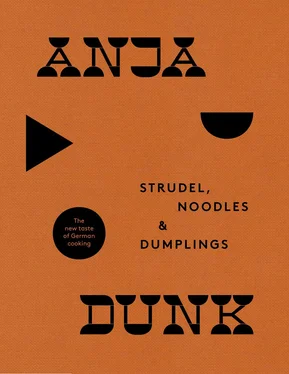•••
Over the last five years we have moved around and lived in five different places (four different countries) with a growing family of three boys. My priority as a mother has been to make this experience fun and stable despite the turmoil that comes with each move. There is a wonderful German word, gemütlich , which when translated into English loosely means ‘cosy’, although in actual fact it means much more but is hard to put into words – to me it really means feeling at home. So, wherever we are in the world, I try to make it gemütlich – and the best way I know to do this is through cooking.
Most of what I cook are recipes with German roots, some of them old family favourites, others dishes and flavours that we simply enjoy. German food, like the food of every European country, has evolved and taken on flavours from much further afield. During the 1950s and 60s, guest workers arrived in post-war Germany to fill the demand for labour in the newly thriving economy, with Italy, Greece and Turkey being among the first countries to sign up for this programme. I don’t think anyone realised at the time how much this movement of people and shift in demographics would also influence the cuisine and tastes of the nation. Along with their labour and skills, these workers brought with them new flavours and ways of cooking, which have filtered into the national cuisine, leaving an everlasting impression.
Home-cooked German food is gently spiced, smoky and buttery, yet sweet and sour. It is warm and hearty and vinegar-laced. The alluring smell of something baking in the oven is ever-present – cakes (and coffee), of course, playing an important role in every day. Beyond the kitchen and down the stairs, cellar shelves are fully laden with jars of preserved goods. From greengages and marbled cake, to Strudel fillings and potted pâtés, to gherkins and plum compote, the list is endless.
The German kitchen is mouth-watering. This way of cooking is vibrant, honest and deeply intertwined with the seasons and weather. I’ve never known anything quite like the excitement felt when the first few spears of white asparagus start to appear at market stalls in the springtime – it ripples across the whole country and is a feeling which resonates quietly throughout the year with the arrival of each new seasonal ingredient.
Until recent years I think both the UK and Germany have been quite outward-looking in terms of food, seduced by the sun of Italy, the Mediterranean and the Middle East, but there seems to be a growing appreciation of colder-climate cooking and ingredients today, probably partly due to the revival and interest in Scandinavian food. There is also a renaissance in German restaurant cooking, similar to what is going on in the UK culinary scene, where many classic dishes are undergoing rejuvenation.
This book is about Germany’s varied culinary heritage seen through the recipes from our family table. It is simple home cooking, inspired by the seasons and by my children, who have brought new life and ideas to many classic recipes.

The kitchen is the place where we come to find comfort. Wrapped in the blanket of security that presents itself in familiar smells from the oven or stovetop, we feel safe. Of all the rooms in a house, the kitchen is the one I like the best. A kitchen sees the bad hair most of us wear in the morning; the licked fingers that we dip back into the pot to test the sauce; the sink full of dirty dishes that highlights exactly what we have cooked and eaten that day; and then there is kitchen talk, so comfortable here that it flows freely, touching on all that matters in life from the profound to the mundane. The kitchen sees and hears it all.
Omi’s Bavarian kitchen, which plays a huge role in the writing of this book, is one I look back on with fondness. It wasn’t big, it wasn’t glitzy; in fact it was nothing special at all. It was functional – utilitarian by design – actually very German. She lived, cooked and ate with gusto and a great deal of common sense. There was an air of no nonsense about her, mind, and rarely did she ever seem harried or flustered. She tasted everything religiously as she cooked – from behind it looked like she was conducting an orchestra, with her arms reaching right for salt, left for this and that, then up and down as she added to the pot or lifted the spoon to her lips. She always kept her ear close to the stovetop, too, listening out for the right sound, which indicated that the dish was ready. ‘But how do you know it sounds right?’ I once asked. ‘I know because I’ve heard it hundreds of times.’ I was in awe and still am when I see anyone conduct or dance at the stovetop like Omi did, allowing their senses to guide the way they cook.
She was thrifty and frugal but somehow still brilliantly inventive, managing to cook fragrant dishes from seemingly ‘nothing’. It was through her I learned that waste was shameful and that leftovers and kitchen scraps are invaluable blocks from which to start building tomorrow’s meal. Omi cooked with wisdom, yet she would not have thought of it like that, for it was just what she did – second nature.
It may seem strange to look to the past as a way of looking forward, but incorporating what has gone before into our present-day family cooking enriches our table, sparking stories and thoughts beyond just the plates and bowls in front of us. Recipes that have stood the test of time have survived for a reason, and more often than not it is these recipes that are the basics I turn to the most, adapting and tweaking them to suit our current tastes better. On the whole this means less sugar, and often I use brown; olive oil and butter instead of dripping (although I am still partial to dripping spread on a slice of fresh bread); less cooking time on vegetables – we prefer them crunchy; and generally speaking less meat.
Most days I wake to a whisper of ‘Mama, get up, I’m hungry’ – it’s little wonder, then, that each day in our household is shaped by food and cooking. From making porridge, soaking pulses and grinding coffee beans in the early morning to putting the bread to rest in its proving basket overnight, snuggling the yogurt down in its warm nest to set, or eating a sliced apple just before bed, what we choose to eat dictates the rhythm of every day here.
Cooking family food at home is never done to impress (believe me, it is hard to impress three boys of seven and under as it is), but to nourish and enhance our daily lives. The boys choose meals in quite an arbitrary fashion – like most children there is no reason beyond taste and enjoyment when it comes down to what they want to eat. Mostly they request things based on a personal whim, and then the hot topic of ‘What’s for dinner?’ is debated and fallen out over until somehow at the end of each day we come to an agreement. When the choice of what to eat falls to me, it is subject to three things: time, which quite often I have little of; what is in season; and lastly, the contents of our shelves.
Our food budget is tight, but I don’t feel it restricts us; on the contrary, it encourages me to be more considered about what we eat and also generally means most things are cooked from scratch. This doesn’t necessarily equate to a meal being more time-consuming to prepare, it just means it might take a little more thought and forward planning. I don’t think food should be a rushed affair, either in the preparation or in the eating of it. It saddens me to think that we sometimes rush through so much of the enjoyment involved with food. When time is the deciding factor of what’s for dinner it means I cook something like an omelette, throw together a salad or make something on toast; there is no need to rush the making of a meal like this because by its very nature it is a quick one. We should relish the time spent preparing meals for what they are.
Читать дальше













